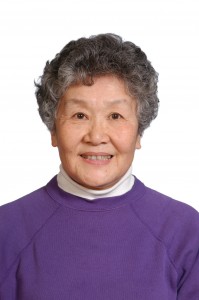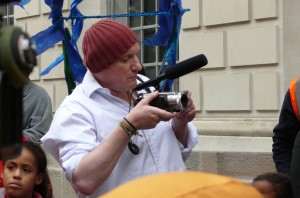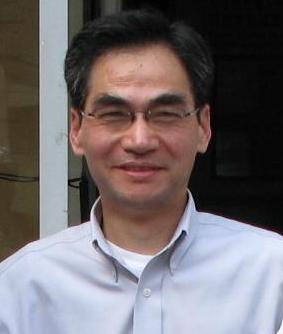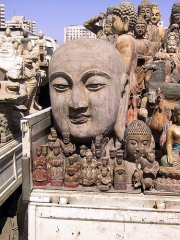The International Conference on New Directions in the Humanities will feature plenary sessions by some of the world’s leading thinkers and innovators in the field, as well as numerous parallel presentations by researchers and practitioners.
Greg Clingham
Judy Lattas
Harry Lewis
James Reeve Pusey
Wu Qing
Marcus Wood
Zhang Zhiqiang
Michael Zhao
Garden Conversations
Plenary Speakers will make formal 30-minute presentations. They will also participate in 60-minute Garden Conversations - unstructured sessions that allow delegates a chance to meet the speakers and talk with them informally about the issues arising from their presentation.
Please return to this page for regular updates.
The Speakers
- Greg Clingham
 Greg Clingham is Professor of English and Director of the University Press at Bucknell University, Pennsylvania, where he teaches courses on literature 1660-1860, and on literature in its relations with law, history, memory, translation, and landscape. He is the author of Johnson, Writing, and Memory (Cambridge UP, 2002) and also of many other books and essays on Johnson, Boswell, Dryden, and a wide range of issues in historiography and translation. He is presently completing essays on Johnson and childhood, and on Johnson and Tolstoy, and books on “Borges and Johnson” and “Law and Narrative, 1660-1960.” Dr Clingham is the general editor of “The Bucknell Studies in Eighteenth-Century Literature and Culture” and of “Apercus: Histories Texts Cultures.” He has held the NEH (National Endowment for the Humanities) Chair in the Humanities at Bucknell (1996-99), and he has taught at Cambridge, Fordham, New York and Bucknell universities. Dr Clingham has been the Donald & Mary Hyde Fellow at the Houghton Library (Harvard), the Frederick A. & Marion S. Pottle Fellow at the Beinecke Library (Yale), and he has held other fellowships at the William Andrews Clark Memorial Library, the NEH, St. Edmund’s Hall, Cambridge, and the Bogliasco Foundation, Italy.
Greg Clingham is Professor of English and Director of the University Press at Bucknell University, Pennsylvania, where he teaches courses on literature 1660-1860, and on literature in its relations with law, history, memory, translation, and landscape. He is the author of Johnson, Writing, and Memory (Cambridge UP, 2002) and also of many other books and essays on Johnson, Boswell, Dryden, and a wide range of issues in historiography and translation. He is presently completing essays on Johnson and childhood, and on Johnson and Tolstoy, and books on “Borges and Johnson” and “Law and Narrative, 1660-1960.” Dr Clingham is the general editor of “The Bucknell Studies in Eighteenth-Century Literature and Culture” and of “Apercus: Histories Texts Cultures.” He has held the NEH (National Endowment for the Humanities) Chair in the Humanities at Bucknell (1996-99), and he has taught at Cambridge, Fordham, New York and Bucknell universities. Dr Clingham has been the Donald & Mary Hyde Fellow at the Houghton Library (Harvard), the Frederick A. & Marion S. Pottle Fellow at the Beinecke Library (Yale), and he has held other fellowships at the William Andrews Clark Memorial Library, the NEH, St. Edmund’s Hall, Cambridge, and the Bogliasco Foundation, Italy.
- Judy Lattas
-
 Judy Lattas is Director of the Interdisciplinary Women’s Studies, Gender and Sexuality program in Sociology at Macquarie University, and was Associate Dean of Learning and Teaching in the Division of Society, Culture, Media and Philosophy from 2006 to 2008. Her PhD thesis was entitled ‘Politics in Labour’, a deconstructivist reading of Hannah Arendt on the philosophical conditions of totalitarianism. In her research she is interested in the popular right in Australia, publishing most recently on gun activism, on secessionist micronations and on the Cronulla ‘race riots’ in Sydney. In the field of learning and teaching she is interested in articulating the art of teaching, in readings of philosophers like Arendt and in bastardisations of Enquiry Based Learning practices.
Judy Lattas is Director of the Interdisciplinary Women’s Studies, Gender and Sexuality program in Sociology at Macquarie University, and was Associate Dean of Learning and Teaching in the Division of Society, Culture, Media and Philosophy from 2006 to 2008. Her PhD thesis was entitled ‘Politics in Labour’, a deconstructivist reading of Hannah Arendt on the philosophical conditions of totalitarianism. In her research she is interested in the popular right in Australia, publishing most recently on gun activism, on secessionist micronations and on the Cronulla ‘race riots’ in Sydney. In the field of learning and teaching she is interested in articulating the art of teaching, in readings of philosophers like Arendt and in bastardisations of Enquiry Based Learning practices.
- Harry Lewis
-
 Harry Lewis is Gordon McKay Professor of Computer Science in the School of Engineering and Applied Sciences at Harvard University, where he received his undergraduate and graduate education and has served on the faculty since 1974. His research training was in mathematical logic and theoretical computer science, but he has taught across the field of computer science during the decades he has participated in its development. He was named Harvard College Professor in recognition of his teaching excellence. He currently teaches courses in the foundations of computer science, on the social consequences of modern digital technology, and on the history and philosophy of athletic competition. Lewis is also a Fellow of the Berkman Center for Internet and Society at Harvard.From 1995-2003 Lewis served as Dean of Harvard College. In this capacity he oversaw the undergraduate experience, including residential life, career services, public service, academic and personal advising, athletic policy, and intercultural and race relations. He is a long time member of the College’s Admissions Committee.
Harry Lewis is Gordon McKay Professor of Computer Science in the School of Engineering and Applied Sciences at Harvard University, where he received his undergraduate and graduate education and has served on the faculty since 1974. His research training was in mathematical logic and theoretical computer science, but he has taught across the field of computer science during the decades he has participated in its development. He was named Harvard College Professor in recognition of his teaching excellence. He currently teaches courses in the foundations of computer science, on the social consequences of modern digital technology, and on the history and philosophy of athletic competition. Lewis is also a Fellow of the Berkman Center for Internet and Society at Harvard.From 1995-2003 Lewis served as Dean of Harvard College. In this capacity he oversaw the undergraduate experience, including residential life, career services, public service, academic and personal advising, athletic policy, and intercultural and race relations. He is a long time member of the College’s Admissions Committee.Lewis is the author of several influential computer science texts, including “Elements of the Theory of Computation,” with Christos Papadimitriou. His 2007 book about higher education, “Excellence Without a Soul: Does Liberal Education Have a Future?,” is a provocative challenge to institutions of higher learning to help students develop a philosophy of life and to value enduring wisdom. It has been translated into Chinese (in both Taiwanese and mainland editions) and Korean. Lewis is coauthor with Hal Abelson and Ken Ledeen of “Blown to Bits: Your Life, Liberty, and Happiness After the Digital Explosion” (2008), a guide for the general reader to the origins and public consequences of the explosion of digital information worldwide.
- James Reeve Pusey
-
 James R. Pusey is a professor of Chinese Studies at Bucknell University, Pennsylvania, United States of America (U.S.), specializing in modern Chinese intellectual history, he teaches courses in Chinese language, history, philosophy, and literature. He is the author of Lu Xun and Evolution (State University of New York Press, 1998) and also of other books and essays on Wu Han, K’ang Yu-wei, Liang Qichao and the impact of Charles Darwin’s theory of evolution in China. The recent publication of a translation of his China and Charles Darwin (Council on East Asian Studies, Harvard UP, 1983) is attracting both widespread interest in China and renewed attention abroad. He has recently completed a book manuscript titled “Confessions of a Chinese History Teacher: Reflection on the 200th Anniversary of the Macartney Mission,” and is working on a book on Deng Tuo.
James R. Pusey is a professor of Chinese Studies at Bucknell University, Pennsylvania, United States of America (U.S.), specializing in modern Chinese intellectual history, he teaches courses in Chinese language, history, philosophy, and literature. He is the author of Lu Xun and Evolution (State University of New York Press, 1998) and also of other books and essays on Wu Han, K’ang Yu-wei, Liang Qichao and the impact of Charles Darwin’s theory of evolution in China. The recent publication of a translation of his China and Charles Darwin (Council on East Asian Studies, Harvard UP, 1983) is attracting both widespread interest in China and renewed attention abroad. He has recently completed a book manuscript titled “Confessions of a Chinese History Teacher: Reflection on the 200th Anniversary of the Macartney Mission,” and is working on a book on Deng Tuo. Dr. Pusey served as a National Committee on U.S.-China Relations interpreter for three early delegations to the U.S. from the People’s Republic of China and as a Chinese speaking aid to Mr. David Rockefeller on his first trip to China. He has held the Douglas Mendel Professorship of Chinese Studies at Middlebury College Summer Chinese School, where he taught for fifteen summers, and he was the Resident Director of the Beijing Program (1991-92) for the Institute of Asian Studies (now IES) in its first year and again in 1997-98. He has also taught at Peking and Beijing Foreign Studies Universities. As a Fulbright scholar, he studied and conducted research in Taiwan (1962-65), Singapore (1965), and Beijing (2003-04). He has also held other research fellowships in Hong Kong and the United States. This summer he will again be conducting research in Beijing.
- Wu Qing
-
 Professor Wu Qing is an active leader of the women’s rights and human rights in China. She was the first People’s Deputy to use the Chinese Constitution, the first to set aside Tuesday afternoon to meet with constituents and the first to report her work to those who have voted her. She upholds rule of law, democracy, oversight and transparency.Professor Wuqing had been teaching English from 1960-2000 at Beijing Foreign Studies University. She won many awards for her excellent teaching as she helped her students to become a whole person. From 1977 – 1979, she hosted English on TV Program for China Central Television (CCTV).
Professor Wu Qing is an active leader of the women’s rights and human rights in China. She was the first People’s Deputy to use the Chinese Constitution, the first to set aside Tuesday afternoon to meet with constituents and the first to report her work to those who have voted her. She upholds rule of law, democracy, oversight and transparency.Professor Wuqing had been teaching English from 1960-2000 at Beijing Foreign Studies University. She won many awards for her excellent teaching as she helped her students to become a whole person. From 1977 – 1979, she hosted English on TV Program for China Central Television (CCTV).Since the mid 1980s, Professor Wuqing has been actively promoting human rights and women’s rights. She was and is a member of many national and international women NGO boards.
Professor Wuqing became a Deputy to the Haidian District People’s Congress in 1984. She is now serving her seventh term at District level. She was a deputy to the Beijing Municipal People’s Congress from 1988 to 2007, put forward and elected by her peer deputies four times. She is democratically elected, regarded as “the Deputy with the Constitution” by the media in China.
In recognizing her contribution in the field of China Women’s Rights and Rule of Law in China, the Philippine government awarded her the Ramon Magsaysay Award for Public Service in 2001. She was nominated by the Schwab Foundation Network as one of the World’s Outstanding Social Entrepreneurs of 2003. She was chosen by the public as one of the twenty people who cared about the rights of peasants in China in 2002. She received an award from China Children’s Publishing House in 2006 for the translation of “Peter Rabbit Series.”
- Marcus Wood
-
 Marcus Wood is a painter, performance artist and film maker, and also a professor in the English department of the University of Sussex. He has been writing books and making art about the memory of Atlantic slavery for the last twenty years. His publications include Blind Memory: Visual Representations of Slavery in England and America 1765-1865 (2000) and Slavery Empathy and Pornography (2003). During the next three years Marcus, as a senior Leverhulme fellow, will be writing a comparative analysis of Brazilian and North American slavery propagandas. This book will have a particular emphasis on Diasporic memory and museum culture.
Marcus Wood is a painter, performance artist and film maker, and also a professor in the English department of the University of Sussex. He has been writing books and making art about the memory of Atlantic slavery for the last twenty years. His publications include Blind Memory: Visual Representations of Slavery in England and America 1765-1865 (2000) and Slavery Empathy and Pornography (2003). During the next three years Marcus, as a senior Leverhulme fellow, will be writing a comparative analysis of Brazilian and North American slavery propagandas. This book will have a particular emphasis on Diasporic memory and museum culture.
- Zhang Zhiqiang
-
 Zhang Zhiqiang is Professor of Publishing Studies and Library Science and Director of the Institute of Publishing Science at Nanjing University, People’s Republic of China, where he is doing his research on Contemporary Chinese Studies, Chinese Print Culture, Library and Information Science, and Communication Sociology. He is the author of The Publishing Research History of China in the 20th Century. (Nanning: Guangxi Education Publishing House, 2004) which was recognized with a Second Prize for Humanities and Social Sciences Academic Achievement in Chinese Universities (2006), a First Prize for Humanities and Social Sciences Academic Achievement in Jiangsu Province (2005), and also of many other books and essays on piracy, history of the book and publishing. He is currently completing his forthcoming monograph “The Social Transformation and the Deluge of Piracy: A Study of the Piracy in Transitional China after 1978. (Nanjing: Nanjing Normal University Press, 2009) and also translating some western scholarships into Chinese including: Gutenberg in Shanghai: Chinese Print Capitalism, 1876-1937 with Pan Wennian (Beijing: Commercial Press, 2009); Publishing, Culture, and Power in Early Modern China with Fu Liangyu (Beijing: Commercial Press, 2009); Books in the Digital Age: The Transformation of Academic and Higher Education Publishing in Britain and the United States with Zhou Yimiao (Nanjing: Yilin Press, 2009). Dr. Zhang is The Chief Editor of Mainland China of the Journal of Educational Media & Library Sciences, (Taiwan) and Council Member of China Editing Association. In 2008 he was recognized as The Outstanding Scholar in Journalism and Publishing of General Administration of Press and Publication of the PRC. He has taught and studied at Harvard (US), Leiden (NL), Nanhua(Taiwan), and Nanjing (PRC) universities. Most recently, Dr. Zhang has been the Harvard-Yenching Postdoctoral Fellow in Book Culture and Librarianship at the Fairbank Center.
Zhang Zhiqiang is Professor of Publishing Studies and Library Science and Director of the Institute of Publishing Science at Nanjing University, People’s Republic of China, where he is doing his research on Contemporary Chinese Studies, Chinese Print Culture, Library and Information Science, and Communication Sociology. He is the author of The Publishing Research History of China in the 20th Century. (Nanning: Guangxi Education Publishing House, 2004) which was recognized with a Second Prize for Humanities and Social Sciences Academic Achievement in Chinese Universities (2006), a First Prize for Humanities and Social Sciences Academic Achievement in Jiangsu Province (2005), and also of many other books and essays on piracy, history of the book and publishing. He is currently completing his forthcoming monograph “The Social Transformation and the Deluge of Piracy: A Study of the Piracy in Transitional China after 1978. (Nanjing: Nanjing Normal University Press, 2009) and also translating some western scholarships into Chinese including: Gutenberg in Shanghai: Chinese Print Capitalism, 1876-1937 with Pan Wennian (Beijing: Commercial Press, 2009); Publishing, Culture, and Power in Early Modern China with Fu Liangyu (Beijing: Commercial Press, 2009); Books in the Digital Age: The Transformation of Academic and Higher Education Publishing in Britain and the United States with Zhou Yimiao (Nanjing: Yilin Press, 2009). Dr. Zhang is The Chief Editor of Mainland China of the Journal of Educational Media & Library Sciences, (Taiwan) and Council Member of China Editing Association. In 2008 he was recognized as The Outstanding Scholar in Journalism and Publishing of General Administration of Press and Publication of the PRC. He has taught and studied at Harvard (US), Leiden (NL), Nanhua(Taiwan), and Nanjing (PRC) universities. Most recently, Dr. Zhang has been the Harvard-Yenching Postdoctoral Fellow in Book Culture and Librarianship at the Fairbank Center.
- Michael Zhao
-
 Michael Zhao is both a Chinese educator and an American entrepreneur. He holds a Ph.D. in Sociology from American University, with a focus on socio-economic development. He has more than 20 years of experience working in education and business management in both China and the United States. For the past three years, Dr. Zhao was Director of China Programs for the Institute for the International Education of Students (IES Abroad), a leading study-abroad institute in the US with 33 centers in 17 countries globally and sending over 5000 students to study abroad annually. In addition to expanding the institute’s existing study abroad center in Beijing, he established IES’s second China center in Shanghai. He has taught at the China Fire Engineering Institute in Xi’an, and in the U.S. at Montgomery College Rockville, Maryland, and at the American University, Washington D.C.
Michael Zhao is both a Chinese educator and an American entrepreneur. He holds a Ph.D. in Sociology from American University, with a focus on socio-economic development. He has more than 20 years of experience working in education and business management in both China and the United States. For the past three years, Dr. Zhao was Director of China Programs for the Institute for the International Education of Students (IES Abroad), a leading study-abroad institute in the US with 33 centers in 17 countries globally and sending over 5000 students to study abroad annually. In addition to expanding the institute’s existing study abroad center in Beijing, he established IES’s second China center in Shanghai. He has taught at the China Fire Engineering Institute in Xi’an, and in the U.S. at Montgomery College Rockville, Maryland, and at the American University, Washington D.C. In the wake of the Beijing Olympics, he has founded China Educational Consulting that specializes in working with Western and Chinese educational institutions. He resides in Beijing.




